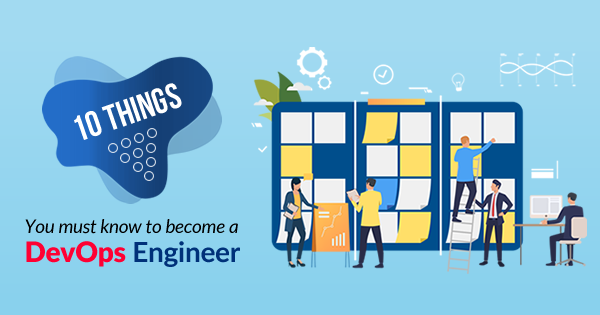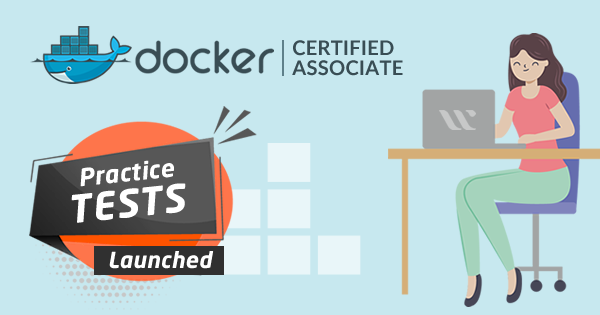Thinking to start a career in DevOps? Here are the 10 things you need to know before starting your DevOps career.
DevOps, as the name implies, is a combination of development and operations. The applications of DevOps in software development receive wide recognition due to their agile nature. DevOps helps in establishing a clear relationship between IT operations and development. The primary objective of DevOps is to strengthen the relationship between development and IT operations. DevOps emphasizes prominently advocacy for better collaboration and communication.
So, many IT professionals prefer a DevOps career due to its massive potential for long-term growth and adoption. However, many people do not have clarity before entering a career in DevOps. Therefore, the following discussion aims at outlining ten important things before entering a DevOps career as a fresher so you could experience the real benefits of DevOps career. You can use this discussion as a guide for determining whether DevOps would be right for you as a beginner. So, let’s start gaining some information, right now!
Important Points to Start a DevOps Career
The demand for DevOps solutions and services is at an all-time high. As a result, the promises in a DevOps career increase manifold. A simple look at these statistics and trends in the DevOps market is enough to prompt anyone to take up a career in DevOps. However, you need to take a note of certain factors before pursuing DevOps career path 2019 as a beginner. You don’t want to make compromises later on in your career, do you?
1. A Clear Understanding of DevOps
The first thing you should focus your attention on is an understanding of DevOps. However, this is also one of the most neglected factors when it comes to choosing a DevOps career in 2019. When you are pursuing a career in DevOps, it is imperative to know exactly what DevOps is and what it is not! DevOps is a movement or culture shift in application or software development.
It emphasizes the need for better and improved communication and collaboration. DevOps aims at leveraging these improvements for delivering high-quality software with better speed and reliability. You can also assume DevOps as an automation process for quick and secure software development. The only difference you would find in DevOps is that all stakeholders are involved in the development process.
When you are starting your DevOps career as a fresher, you should also take note of what does not qualify as DevOps. DevOps is not an individual or a particular job role or title. It does not involve using a specific set of tools or renaming your operations team as a DevOps team. As we discussed here, DevOps is a cultural shift or change in paradigm. It presents a productive and cost-effective approach that deviates from the traditional precedents in software development. If you aspire to land your dream job in cloud, we recommend you to search for AWS jobs near me and find the right job for you.
Must Read: List of Top 10 DevOps Tools in 2019
2. Background and Existing Knowledge
The next important concern for choosing a DevOps career in 2019 is your background. Individuals with prior working experience in the technology field can have the necessary experience and insights for becoming DevOps engineers. Some of the roles that prepare you well for DevOps career as a beginner are software developer, systems engineer, systems administrator, and others.
Network operations engineers or database administrators could also make the most of their experience for pursuing a career in DevOps. However, individuals stepping into a career in DevOps after just completing their degree in computer science have more to learn!
This can help in a better understanding of the responsibilities of a DevOps professional. Here are the three roles that you can find for DevOps professionals in modern enterprises.
- The first role refers to DevOps engineers with dev bias, and they are ideal software development roles for application building.
- The second role in your DevOps career can be that of a DevOps engineer with ops bias. This role is similar to a system engineer or system administrator.
- The third role for DevOps professionals in enterprises can be that of a Site Reliability Engineer (SRE). SREs are similar to software engineers responsible for solving issues in infrastructure and operations. SREs have a focus on the creation of software systems with higher availability, scalability, and reliability.
Note: Whether you are aspiring to become an AWS DevOps professional or Azure DevOps professional, you need to take a look at these responsibilities in which you can serve in a DevOps role. To become an AWS DevOps professional, you can go for AWS DevOps certification, and to become an Azure DevOps professional, it is recommended to go for Azure DevOps certification.
3. Taking Note of Crucial Technologies
The technologies for the DevOps career should also be on your priority list before choosing your career path in DevOps. You need to specialize in different technologies for addressing your job requirements efficiently. Aspiring candidates for DevOps beginner career should learn the fundamental technologies that they will use in their jobs.
You have to cover the basics of the operating system, scripting, cloud, containers, and programming languages thoroughly. Operating systems are the basic foundation on which everything runs. Therefore, you should improve your knowledge about Linux since you would be using it daily. Candidates should also learn about a particular language ideal for scripting purposes.
Some of the notable scripting languages include Python, PowerShell, Java, Ruby, Go, C/C++, and Bash. You should also improve your skills and knowledge in the use of cloud computing resources on platforms like AWS or Azure. Another noticeable skill for a career in DevOps refers to the use of containers. The use of tools such as Docker and container orchestration platforms like Kubernetes is a mandatory requirement. You can also check the Chef vs Puppet comparison to learn about both of these.
Also Check: Top 10 Differences between OpenShift and Kubernetes
Furthermore, candidates entering a DevOps career for software development should have fluency in programming skills. You could use specialization in scripting languages to your advantage in this context. Also, candidates should learn about Jenkins and GitHub that are common requirements for the CI/CD process.
Jenkins interview questions are very common in a DevOps interview. Here are top 30 Jenkins interview questions that will make you ready for the interview.
4. Certifications can Help You!
The radical rise in attention and demand for DevOps has also prompted many important questions related to career. For example, “is DevOps good for freshers?” comes up frequently in the mind of aspirants. The answer to this question forms another important factor to focus on before entering a career in DevOps.
Certifications, as well as training and development programs, could contribute substantially to the resolution of skill gaps. Certifications are useful for the development of your skills and presenting a credible reason for employers to hire you. So, even if you are a fresher, you can gradually build your career path in DevOps gradually through a DevOps certification.
5. Move beyond the Comfort Zone
The support of certifications would not be sufficient for starting a career in DevOps. Candidates also need to focus on cross-training for gaining skills beyond their comfort zone. As developers, you can have tendencies to rely on operations professionals when transitioning to a career in DevOps.
Developers can use their knowledge and experience with various DevOps tools for fulfilling their new roles in DevOps. Therefore, candidates should always aim at obtaining practical experience by taking on challenging projects. System administrators could develop their scripting skills for making a transition to DevOps roles. So, you need to look beyond the scope of your current job role to find a better career path in DevOps.
6. Learning Automation
The importance of automation in DevOps roles is very important. So, you need to improve your knowledge and skills in automation for pursuing a DevOps career. DevOps professionals capable of implementing automation tools for managing servers and deployments are preferred choices of employers. Candidates can improve their marketability by mastering various automation tools and practices. Therefore, experts recommend learning new things as well as intricacies of the automation process for aspiring DevOps professionals.
7. Developing your Brand
Since we are talking about marketability, let us arrive at another important factor for entering a career in DevOps. What is that? Your brand! As you know, DevOps is more about a culture shift rather than the implementation of various tools. Also, DevOps focuses on improved collaboration and communication.
Therefore, candidates should participate in the ever-growing and active DevOps community for developing intrinsic skills and showcasing the DevOps skills. You can choose to speak at industry events or even write blogs or frequently communicate with colleagues on online forums.
Furthermore, you could also try participating in open-source projects to present a strong claim for a DevOps career. Most important of all, you should not consider community involvement as just one measure to advance your career. On the contrary, you should approach it as a channel for interactions with other DevOps professionals.
8. Making Use of Training Courses
Candidates preparing for a career in DevOps are right in wondering ‘is DevOps good for freshers?’. However, you can take note of the various DevOps certifications training courses that can help freshers prepare for a career in DevOps. Fresher candidates can prefer different routes for developing skills. The first option refers to classroom training in college courses.
The specific highlight, in this case, should be the focus on developing technical competencies required for DevOps beginner roles. Furthermore, you also have the option of massively open online courses on DevOps freshers to learn the basics. These courses can help you make the most of the training based on real-world applications.
9. Searching for Jobs in DevOps
The next most crucial concern relates to the search for a job in DevOps. If you are a fresher, then try applying for various job vacancies for junior DevOps engineers. You need to keep in mind that, as a fresher, you will not get many opportunities for a career in DevOps. However, don’t let it discourage you from your career aspirations! Many companies emphasize on training and upgrading the skills of freshers. When you have a clear scope for development, why do you need to worry?
With the increasing demand for Azure DevOps engineers, candidates are moving towards DevOps career. Here is our guide to become an Azure DevOps Engineer!
10. Showcase Curiosity and Empathy
As discussed earlier, communication and collaboration lie at the center of every DevOps career. Therefore, the last yet most significant factor before choosing DevOps career as a fresher refers to soft skills like curiosity and empathy. You should always be curious for knowledge and involvement in the team and community.
Furthermore, you should also show empathy for everyone in the team and their tasks. As a result, you can foster a harmonious work environment, thereby strengthening your career prospects in DevOps. Most important of all, candidates should develop abilities for understanding the challenges associated with each role in DevOps team.
Trends in the DevOps Market
Now that we have discussed the crucial factors before choosing DevOps career path 2019, let us have a look at the DevOps industry trends. According to industry experts, DevOps would reach the peak of popularity in 2019. The increase in DevOps adoption at a rate of 8% from 2015 to 2016 would continue in 2019. Furthermore, Statista also reports that various organizations increasingly prefer the adoption of DevOps.
DevOps adoption increased from 10% in 2017 to 17% in 2018. Most important of all, estimates suggest that the DevOps market would reach around 10.31 billion USD by 2023. During this estimated growth, the Compound Annual Growth Rate (CAGR) would be 24.7%. Pretty impressive, isn’t it? Every organization needs fast application delivery without any compromise in quality.
Final Words
On a concluding note, DevOps fresher career presents promising opportunities for a flourishing career. However, it is also important for every candidate to develop the right skills and mindset for a career in DevOps. If you are already on the path to a career in DevOps, then you must have focused on some of these tenets mentioned above.
However, the future is a lot complicated for a career in DevOps. So, whether you are a fresher or experienced, validate your skills with a DevOps certification and stand out of the crowd. If you are aspired to become a certified DevOps professional, start your preparation with the DevOps Certifications Training Courses.
Candidates should understand the most basic precedent in DevOps, i.e., communication and collaboration. Without a proper understanding of the requirements from a DevOps job role, you will most likely end up mugging a lot of information. So, be careful while proceeding ahead in your career aspirations in the field of DevOps!
- Top 10 Highest Paying Cloud Certifications in 2024 - March 1, 2023
- 12 AWS Certifications – Which One Should I Choose? - February 22, 2023
- 11 Kubernetes Security Best Practices you should follow in 2024 - May 30, 2022
- How to run Kubernetes on AWS – A detailed Guide! - May 30, 2022
- Free questions on CompTIA Network+ (N10-008) Certification Exam - April 13, 2022
- 30 Free Questions on Microsoft Azure AI Fundamentals (AI-900) - March 25, 2022
- How to Integrate Jenkins with GitHub? - March 22, 2022
- How to Create CI/CD Pipeline Inside Jenkins ? - March 22, 2022








Really great article, Glad to read the article. It is very informative for us. Thanks for posting.